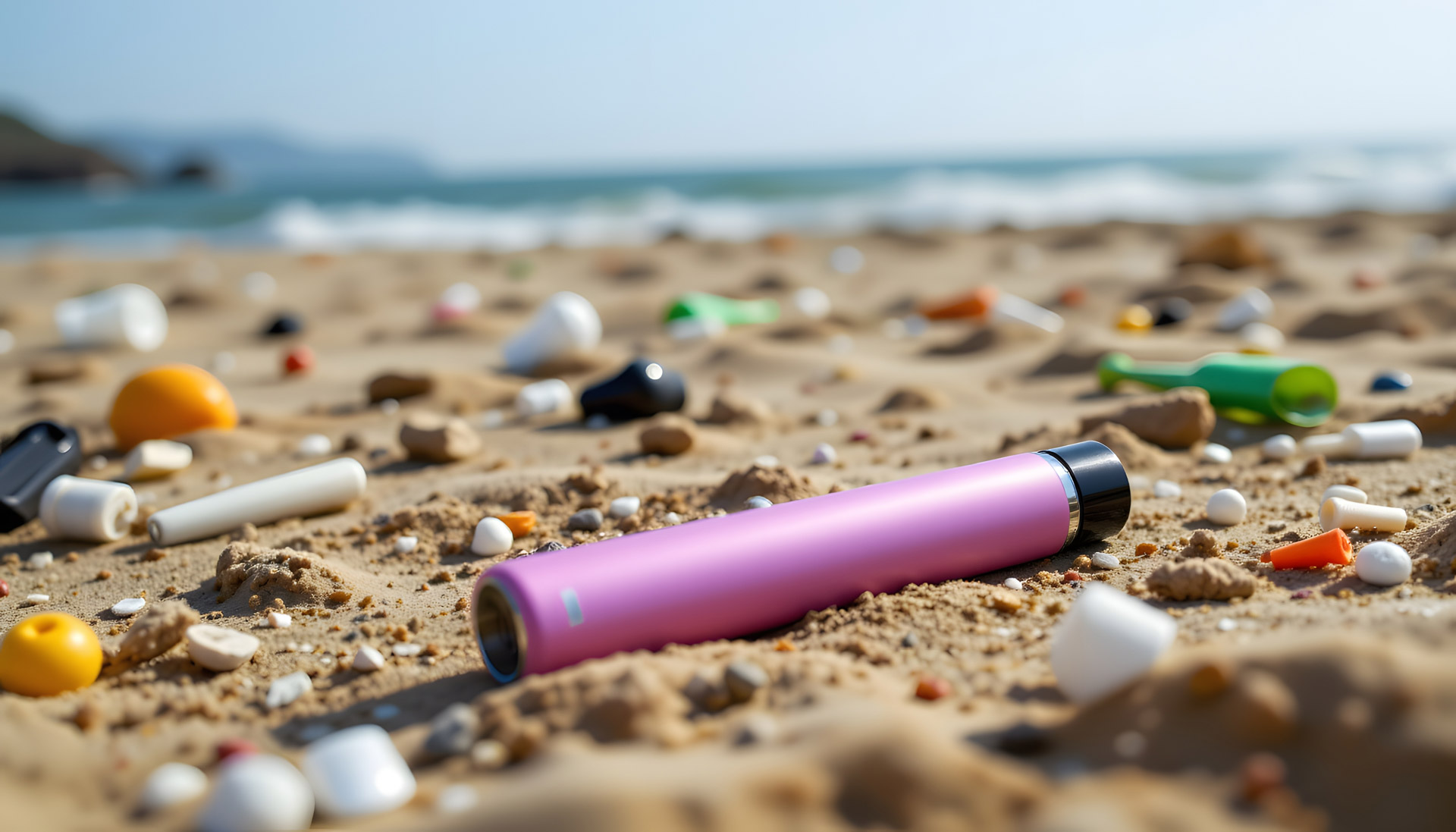Single-use vape ban takes effect across UK from 1 June
UK-wide legislation prohibits retailers from selling disposable vaping devices as environmental waste reaches five million units weekly with mounting fire risks and youth appeal concerns driving enforcement action
 A UK-wide ban on the sale and supply of single-use vapes comes into force this weekend (1 June 2025), making it illegal for businesses to stock, sell or offer disposable vaping devices across all retail channels.
A UK-wide ban on the sale and supply of single-use vapes comes into force this weekend (1 June 2025), making it illegal for businesses to stock, sell or offer disposable vaping devices across all retail channels.
From Sunday, it is illegal for businesses to sell or supply single-use vapes, extending to stocking single-use vapes to sell or supply. The legislation applies to all single-use vapes regardless of nicotine content, covering both online and physical retail outlets.
Trading Standards departments will lead enforcement across England, with local authorities responsible in Scotland and Wales. In the first instance, Trading Standards will apply civil sanctions (non-criminal penalties). For example, a stop notice, compliance notice, fine of £200. Repeat offenders face unlimited fines and prison sentences of up to two years.
The ban addresses escalating environmental concerns, with nearly five million disposable single-use vapes now thrown away each week according to research by Material Focus. This represents almost four times the number since the research was first conducted, when 1.3 million devices were discarded weekly.
Of the 13.5 million vapes bought per week in 2024, 8.2 million are binned or wrongly recycled, with Material Focus warning that inadequate recycling infrastructure contributes to mounting waste management costs running at an estimated at £200 million a year.
Environmental impact drives regulatory response
The devices contribute to what Material Focus describes as "the fastest-growing and most dangerous waste stream in the UK". Single-use vapes contain valuable materials including lithium, with over 40 tonnes of lithium batteries from disposable vapes discarded in 2022 - enough to power 5,000 electric vehicles.
The number of battery fires has also increased by 71 per cent, going from 700 in 2022 to over 1,200 in the last year, creating safety risks for waste management workers and local communities. In many of these cases, lithium batteries, which are used to power vapes, appear to be the primary culprits.
Research indicates that over 90 per cent of vape producers and 90 per cent retailers are not fulfilling their statutory obligations to provide and pay for takeback and recycling for vapes. Of 764 retailers surveyed across 13 UK cities, only 86 stores (11 per cent) provided recycling points.
Youth vaping concerns underpin policy decision
The ban also targets rising youth vaping rates, with research showing nearly one in six Year 11 pupils in Wales vape regularly, with almost half having tried vaping. Government data indicates that a quarter of 11-15-year-olds used a vape last year and disposables are the product of choice for the majority of kids vaping today.
Public Health Minister Andrew Gwynne stated: "Banning disposable vapes will not only protect the environment, but importantly reduce the appeal of vapes to children and keep them out of the hands of vulnerable young people".
The legislation follows extensive public consultation, with 69 per cent of respondents supporting the restriction in a February 2024 consultation. Wales' Deputy First Minister Huw Irranca-Davies said: "Single-use vapes create litter and plastic pollution; this ban will help stop the serious harm these products cause to our wildlife and environment".
Dr Adam Read MBE, Chief External Affairs and Sustainability Officer for SUEZ recycling and recovery UK commented: “We wholeheartedly welcome this ban. The sheer ubiquity of single-use vapes has been an escalating problem for the entire waste industry. This legislation, as well as cutting the number of children becoming addicted to nicotine, will also significantly reduce the quantity of lithium-ion batteries entering the general waste stream. The result has to be a safer waste industry, fewer costly and inconvenient service interruptions and a let-up in the pressure placed by battery fires on our emergency services.
Business compliance and transition requirements
Retailers must have disposed of all single-use vape stock by the deadline, with any remaining inventory requiring responsible recycling through registered services.
Businesses selling vapes must continue offering take-back recycling services under Waste Electrical and Electronic Equipment (WEEE) regulations, accepting returned devices and components for proper disposal.
The ban specifically targets devices that are neither refillable nor rechargeable. Reusable vapes remain legal provided they feature rechargeable batteries, refillable containers, and replaceable coils where applicable.
Industry representatives have expressed concerns about enforcement capacity and potential black market growth. However, Trading Standards received £10 million in government funding to tackle the illegal vape market in March 2025.
The legislation forms part of broader regulatory measures, including the forthcoming Tobacco and Vapes Bill which will restrict vape flavours, packaging and advertising. A vaping products duty of £2.20 per 10ml will be introduced from October 2026.
Owen Derbyshire, Chief Executive of Keep Wales Tidy, said: "Nearly half of all clean-ups undertaken by our volunteers last year found these harmful products. They're a blight on our communities, a danger to wildlife, and near impossible to recycle".
Sian Sutherland, Co-Founder of A Plastic Planet & Plastic Health Council, commented: "The government's ban on single-use disposable vapes is a welcome recognition of how urgently we need to rethink wasteful, short-term products. Five million vapes discarded weekly is the result of a fractured system that has disregarded the environment and public health for too long".






